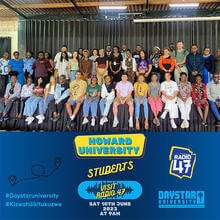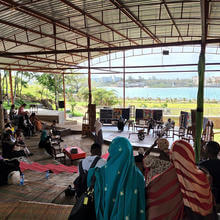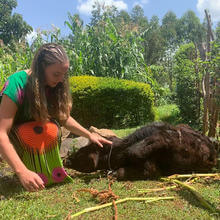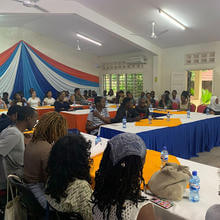Alexa's Swahili Study Abroad Comparisons
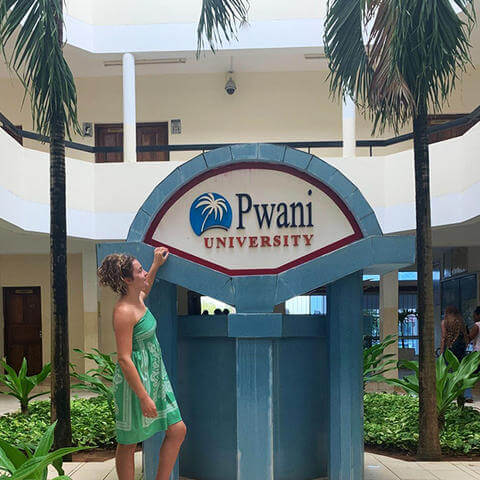
By Alexa Baker, International Affairs Undergraduate Student
HU Swahili Study Abroad (HUSSA) Program - Summer 2023
Fulbright-Hays Swahili Group Project Abroad - Summer 2022
This summer I had the privilege of returning to Kenya to continue my Swahili language studies with the Howard University Swahili Study Abroad Program. Last year I received a Fulbright-Hays award to study with an immersive and extensive Swahili study abroad program led by Howard University. In addition, anything not covered by the HUSSA or Fulbright program was covered by my Foreign Language and Area Studies (FLAS) fellowship. The director of the program, Dr. Leonard Muaka is also the Chair of the Department of World Languages and Cultures at Howard University. He also happens to be my first Swahili professor and I credit the entirety of my Swahili scholarship to him. A Kenyan native, Dr. Muaka has dedicated his summers to Swahili study abroad programs that immerse students in East African culture which develop students’ Swahili abilities exponentially.
The makeup of the program is oriented around traditional classroom learning, excursions to cultural and historical sites, primary school visits, and guest lectures from scholars. Between both years I have visited places like World Kiswahili Language Day, Marafa Depression, Fort Jesus in Mombasa, Mombasa port, West Kenya Sugar Factory, National Museum of Kenya, Gedi Ruins, Tsavo East National Park, Nabongo Wanga Kingdom Cultural Center, Bomas of Kenya, Nakuru Country tea farms, and the Great Rift Valley. Structurally, the HUSSA program and Fulbright-Hays program travel and experience their programs together. Having the programs together is mutually beneficial as students are exposed to a diverse academics from across America. Undergraduate students may have Swahili classes with pHd candidates from a variety of academic disciplines. The connections made in this program are enduring and provide students with a deeper understanding of their fellow Americans in the process.
The program has partnered with Daystar University in Nairobi and Pwani University in Kilifi. Daystar is a private and Christian while Pwani is public. Daystar is located in central Kenya while Kilifi is on the coast and is predominantly Muslim. These varied features allow for students in the program to be exposed to Kenyans from all backgrounds which inherently improves the students’ understanding of language and culture.
Without a fully-funded opportunity like Fulbright-Hays Swahili Group Project Abroad or Howard University Swahili Study Abroad program and FLAS, I would not have been able to travel outside of the US. Last year, when I embarked on the journey to Kenya with the Fulbright program, it was my first time leaving the US at 19 years old. My story is not a rare one, as I soon found that several other students in the program had never traveled abroad before.
Across both years and both programs, I have seen a general trend in culture shock in the American students. Students struggle the most with adapting to social norms like food, clothing and communication. Firstly, many students have not been exposed to East African cuisine or eating patterns. Secondly, Students sometimes struggle with choice of clothing due to the general dress code of modesty. Some clothing items that are not viewed as suggestive or provocative in America are viewed as such in Kenya under certain situations such as school and daytime public outings. Thirdly, American speech patterns and communication styles are overt and direct. This is juxtaposed to the Kenyan and East African context where communication is indirect, non-confrontational, and covert in some manners.
This year, following the Howard University Swahili Study Abroad (HUSSA) program, I traveled to Tanzania. Just the second country I have been to outside of the US, Tanzania provided me with the opportunity to put my Swahili language skills to the test while also expanding my knowledge of East Africa.
I boarded the Tahmeed bus from Mombasa to Dar es Salaam in mid July. I had one suitcase, backpack, and Maasai shuka to keep me warm during the journey. After 12 hours I arrived in Dar with previous communication that I would be picked up from the bus station, the name of which, Shekilango, I struggled to pronounce even after nearly studying Swahili for three years. As soon as I stepped off the bus, I was immediately approached by bajaji and pikipiki drivers who were ready to bring me to my next location. Suddenly, I was tapped on the shoulder and met with a familiar face of whom I knew was the contact I was prepared for to meet.
Eventually I settled into Dar and began visiting family, going to tourist attractions, and experiencing Tanzanian life, full of the sounds of Sakata and Singeli. I visited the National Museum and House of Culture, Mbudya Island, Kariakoo Market, and several beaches that form the perimeter of Dar and adjacent towns. Also, I toured the University of Dar es Salaam and made several connections with professors and other students.
Although I have spent a total of 6 months in Kenya and only 1 month in Tanzania, I have seen immediate differences linguistically and culturally. These observations were made from my general experience as an American college student learning Swahili and studying African studies and Afro-centric international affairs.
While English is more broadly used in Kenya, Tanzanians are much more protective and promotional of the Swahili language in all sectors of society. As a Swahili student, I felt that my abbreviated time spent in Tanzania exponentially developed my Swahili language in comparison to my time spent in Kenya. This is largely due to the fact that English is always there as a safety net, and Kenyan students prefer using English when speaking to Americans. In Tanzania however, regardless of your background, there is the general expectation that Swahili will be the primary language unless otherwise decided. Without the English preference, students are forced to use Swahili outside of the classroom setting and with peers their age. As a recommendation, I believe a program that spends the first half of the time in Kenya and the second half in Tanzania would both maximize the student’s productivity in terms of linguistic and cultural understanding of East Africa.
Politically, Tanzania was previously communist following President “Mwalimu” Julius Nyerere and that communalistic societal paradigm is ever-present in social norms and daily life. Juxtaposed with Kenya, a capitalist country, which is comparable to American social norms. Being that Tanzania was the first country I have been to that has a communist history, I started noticing differences in the strength of social networks, attitude towards other individuals, and lack of ethnic tension and discussion among the Tanzanian population. In Kenya, ethnic tension is much more prevalent due to a history of politics and political leaders that have weaponized ethnic divides to maintain power as a colonial legacy. The diverse political socialization processes and outcomes that have taken place in Kenya and Tanzania have produced vastly different societies despite shared and related languages and cultures.
Overall, my experience both years have been eye-opening and rewarding in ways that I continue to discover. I plan to graduate this Fall from Howard with a bachelor’s degree in international affairs and minors in African studies and Swahili. Following graduation I plan to attend University of Dar es Salaam for a master’s degree in linguistics. My time in Tanzania solidified my passion for studying Swahili and East African international affairs. I have reunited with family, established new professional connections, and experienced new adventures. I am looking forward to my future in Bongoland and wherever else my life journey takes me!

